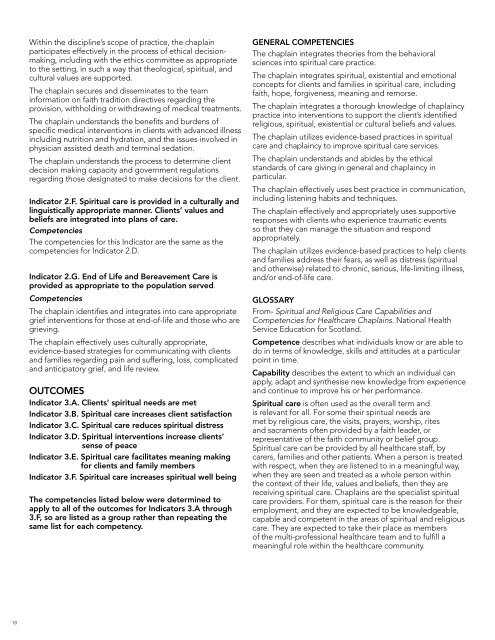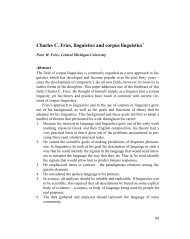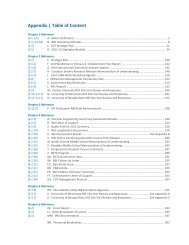TIME TO MOVE FORWARD
time_to_move_forward_report_2016-06-07
time_to_move_forward_report_2016-06-07
You also want an ePaper? Increase the reach of your titles
YUMPU automatically turns print PDFs into web optimized ePapers that Google loves.
Within the discipline’s scope of practice, the chaplain<br />
participates effectively in the process of ethical decisionmaking,<br />
including with the ethics committee as appropriate<br />
to the setting, in such a way that theological, spiritual, and<br />
cultural values are supported. <br />
The chaplain secures and disseminates to the team<br />
information on faith tradition directives regarding the<br />
provision, withholding or withdrawing of medical treatments. <br />
The chaplain understands the benefits and burdens of<br />
specific medical interventions in clients with advanced illness<br />
including nutrition and hydration, and the issues involved in<br />
physician assisted death and terminal sedation. <br />
The chaplain understands the process to determine client<br />
decision making capacity and government regulations<br />
regarding those designated to make decisions for the client.<br />
Indicator 2.F. Spiritual care is provided in a culturally and<br />
linguistically appropriate manner. Clients’ values and<br />
beliefs are integrated into plans of care.<br />
Competencies<br />
The competencies for this Indicator are the same as the<br />
competencies for Indicator 2.D.<br />
Indicator 2.G. End of Life and Bereavement Care is<br />
provided as appropriate to the population served.<br />
Competencies<br />
The chaplain identifies and integrates into care appropriate<br />
grief interventions for those at end-of-life and those who are<br />
grieving.<br />
The chaplain effectively uses culturally appropriate,<br />
evidence-based strategies for communicating with clients<br />
and families regarding pain and suffering, loss, complicated<br />
and anticipatory grief, and life review.<br />
OUTCOMES<br />
Indicator 3.A. Clients’ spiritual needs are met<br />
Indicator 3.B. Spiritual care increases client satisfaction<br />
Indicator 3.C. Spiritual care reduces spiritual distress<br />
Indicator 3.D. Spiritual interventions increase clients’<br />
sense of peace<br />
Indicator 3.E. Spiritual care facilitates meaning making<br />
for clients and family members<br />
Indicator 3.F. Spiritual care increases spiritual well being<br />
The competencies listed below were determined to<br />
apply to all of the outcomes for Indicators 3.A through<br />
3.F, so are listed as a group rather than repeating the<br />
same list for each competency.<br />
GENERAL COMPETENCIES<br />
The chaplain integrates theories from the behavioral<br />
sciences into spiritual care practice.<br />
The chaplain integrates spiritual, existential and emotional<br />
concepts for clients and families in spiritual care, including<br />
faith, hope, forgiveness, meaning and remorse.<br />
The chaplain integrates a thorough knowledge of chaplaincy<br />
practice into interventions to support the client’s identified<br />
religious, spiritual, existential or cultural beliefs and values. <br />
The chaplain utilizes evidence-based practices in spiritual<br />
care and chaplaincy to improve spiritual care services. <br />
The chaplain understands and abides by the ethical<br />
standards of care giving in general and chaplaincy in<br />
particular.<br />
The chaplain effectively uses best practice in communication,<br />
including listening habits and techniques.<br />
The chaplain effectively and appropriately uses supportive<br />
responses with clients who experience traumatic events<br />
so that they can manage the situation and respond<br />
appropriately.<br />
The chaplain utilizes evidence-based practices to help clients<br />
and families address their fears, as well as distress (spiritual<br />
and otherwise) related to chronic, serious, life-limiting illness,<br />
and/or end-of-life care.<br />
GLOSSARY<br />
From- Spiritual and Religious Care Capabilities and<br />
Competencies for Healthcare Chaplains. National Health<br />
Service Education for Scotland.<br />
Competence describes what individuals know or are able to<br />
do in terms of knowledge, skills and attitudes at a particular<br />
point in time.<br />
Capability describes the extent to which an individual can<br />
apply, adapt and synthesise new knowledge from experience<br />
and continue to improve his or her performance.<br />
Spiritual care is often used as the overall term and<br />
is relevant for all. For some their spiritual needs are<br />
met by religious care, the visits, prayers, worship, rites<br />
and sacraments often provided by a faith leader, or<br />
representative of the faith community or belief group.<br />
Spiritual care can be provided by all healthcare staff, by<br />
carers, families and other patients. When a person is treated<br />
with respect, when they are listened to in a meaningful way,<br />
when they are seen and treated as a whole person within<br />
the context of their life, values and beliefs, then they are<br />
receiving spiritual care. Chaplains are the specialist spiritual<br />
care providers. For them, spiritual care is the reason for their<br />
employment, and they are expected to be knowledgeable,<br />
capable and competent in the areas of spiritual and religious<br />
care. They are expected to take their place as members<br />
of the multi-professional healthcare team and to fulfill a<br />
meaningful role within the healthcare community.<br />
18








